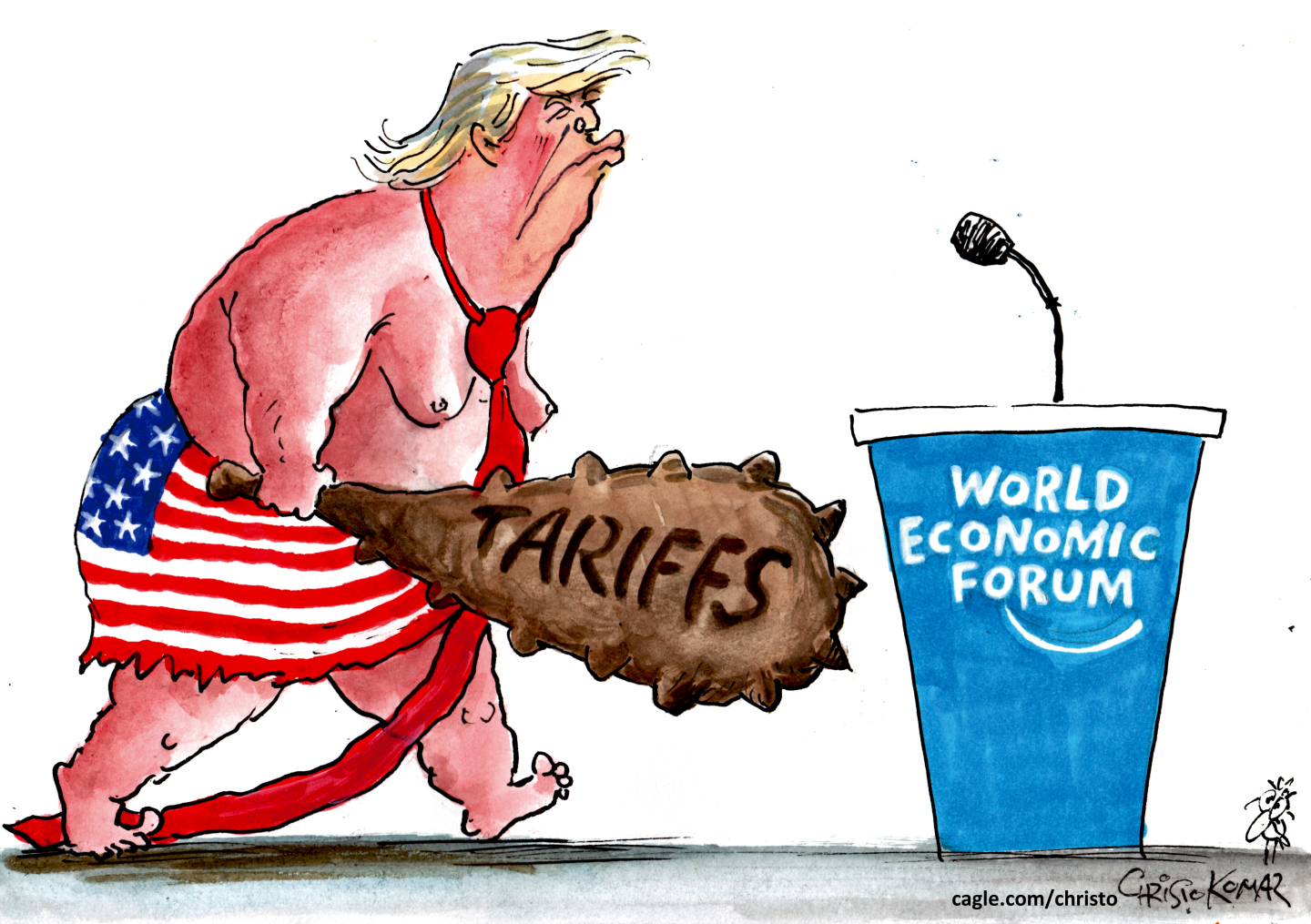Donald Trump's economic amber
America already has a horribly muddled industrial policy. Trump is about to make it even worse.


What if industrial policy — a national strategy to promote certain industries or sectors of the economy — never went away? What if it can't go away? And what if Donald Trump is about to make it much, much worse?
Trump and Mike Pence recently cut a deal to save several hundred jobs that Carrier, a manufacturer of air conditioners and gas furnaces, had planned to relocate from Pence's home state of Indiana to Mexico. It was a minor public-relations coup, to be sure, but questionable on the merits. On this, economists on the left and right largely agreed, if for different reasons.
Center-left economists like Larry Summers, the former treasury secretary, warned that the nature of the deal portends a transition from "rule of law capitalism" to the "ad hoc deal-based capitalism" of authoritarian regimes like China. Sen. Bernie Sanders (I-Vt.) wrote: "Trump has endangered the jobs of workers who were previously safe in the United States. Why? Because he has signaled to every corporation in America that they can threaten to offshore jobs in exchange for business-friendly tax benefits and incentives." (Trump has since threatened to impose a retributive 35-percent tariff on companies that move abroad, but he offered no details, he can't do so unilaterally, and Congress is not likely to go along.)
The Week
Escape your echo chamber. Get the facts behind the news, plus analysis from multiple perspectives.

Sign up for The Week's Free Newsletters
From our morning news briefing to a weekly Good News Newsletter, get the best of The Week delivered directly to your inbox.
From our morning news briefing to a weekly Good News Newsletter, get the best of The Week delivered directly to your inbox.
Many conservatives fell back on time-honored free-market rhetoric: that is, government shouldn't be in the business of picking winners and losers in the marketplace. Sarah Palin derided the Carrier deal as "crony capitalism." The Wall Street Journal editorial board called it a "shakedown" and asked: "[W]ho would you rather have making a decision about where to make furnaces or cars? A company whose profitability depends on making good decisions, or a branding executive turned politician who wants to claim political credit?" National Review's Jonah Goldberg worried that the deal signaled "that industrial policy is back."
Don't call it a comeback. Industrial policy has been here for years.
In his book The Betrayal of American Prosperity, former Reagan administration trade official Clyde Prestowitz argues that the United States has long pursued a national economic strategy. It just happens to be a patchwork of industrial policies that no one consciously adopted but that, nonetheless, is the direct result of federal spending and regulations.
For the last 30 years, writes Prestowitz, America's industrial policy has looked something like this:
A free daily email with the biggest news stories of the day – and the best features from TheWeek.com
It is to overconsume, and to promote weapons production, financial services, construction, medical research and services, agriculture, and oil and gas consumption and production. Further, it is both to offshore production and provision of all tradable manufacturing and services as well as, increasingly, high-technology R&D, and to expand the domestic retail, food service, and personal medical services industries. At the macro level, the strategy is to run up massive debt and borrow as much and as long as possible. [The Betrayal of American Prosperity]
Did lawmakers or administration officials consciously and coherently choose to adopt this suite of policies? No. But Prestowitz asserts that such a lack of premeditation doesn't mean the United states eschews industrial policy. It just means we have lousy and often wasteful industrial policy.
In Concrete Economics: The Hamilton Approach to Economic Growth and Policy, Stephen Cohen and Brad DeLong dispel the notion that industrial policy is tantamount to command-and-control dirigiste economics. "We do not propose the content of such a redesign, complete with dubious numerical targets," they write. "That is not how it happened in the successful American past." Concrete Economics points not only to the most cited examples of government-promoted development — from railroads to the internet — but to concatenations of industrial policy that had far-reaching socioeconomic effects.
After World War II, for example, government promotion of affordable long-term mortgages led to suburbs, which led to more highways and cars and washing machines and furniture. All this growth was underpinned by a "steadily growing and secure market for mortgages and automobile loans; and municipal bonds for infrastructure and schools to please the regulated and respectable finance industry."
Industrial policy goes wrong, according to Cohen and DeLong, when it's conducted in the "speculative realms of ideology and its handmaiden theoretical abstractions." Prime example: The bipartisan unleashing of the financial services industry, which begat the Great Recession. When it goes right, industrial policy is "image-able, as in, 'This is the kind of thing we will get.' "
Which brings us back to Trump, Pence, and Carrier.
Where do they think their industrial policy will take us? Do they have a vision of where the American economy should be heading (like, say, President Obama's green-energy policies)? It's obvious that Trump is asking no such questions. He's simply attempting to preserve in economic amber the labor-intensive manufacturing robustness of his nostalgia-added imagination. And he's privileging manufacturing jobs over jobs in the service industry for no sound economic reason.
As FiveThirtyEight's Ben Casselman writes: "A combination of bribes and threats may have saved Carrier workers' jobs — and still only some of them — but it isn't going to bring back the glory days of American manufacturing. Nothing will. The forces that have driven the decline in U.S. factory employment — globalization and automation — are here to stay."
In other words, Trump will no more be able to bring back the economy of 1950 than he will the social and racial hierarchy of 1950.
Scott Galupo is a freelance writer living in Virginia. In addition to The Week, he blogs for U.S. News and reviews live music for The Washington Post. He was formerly a senior contributor to the American Conservative and staff writer for The Washington Times. He was also an aide to Rep. John Boehner. He lives with his wife and two children and writes about politics to support his guitar habit.
-
 Ryanair/SpaceX: could Musk really buy the airline?
Ryanair/SpaceX: could Musk really buy the airline?Talking Point Irish budget carrier has become embroiled in unlikely feud with the world’s wealthiest man
-
 Claudette Colvin: teenage activist who paved the way for Rosa Parks
Claudette Colvin: teenage activist who paved the way for Rosa ParksIn The Spotlight Inspired by the example of 19th century abolitionists, 15-year-old Colvin refused to give up her seat on an Alabama bus
-
 5 contentious cartoons about Donald Trump at Davos
5 contentious cartoons about Donald Trump at DavosCartoons Artists take on weaponized tariffs, a cheeky offering, and more
-
 The billionaires’ wealth tax: a catastrophe for California?
The billionaires’ wealth tax: a catastrophe for California?Talking Point Peter Thiel and Larry Page preparing to change state residency
-
 Bari Weiss’ ‘60 Minutes’ scandal is about more than one report
Bari Weiss’ ‘60 Minutes’ scandal is about more than one reportIN THE SPOTLIGHT By blocking an approved segment on a controversial prison holding US deportees in El Salvador, the editor-in-chief of CBS News has become the main story
-
 Has Zohran Mamdani shown the Democrats how to win again?
Has Zohran Mamdani shown the Democrats how to win again?Today’s Big Question New York City mayoral election touted as victory for left-wing populists but moderate centrist wins elsewhere present more complex path for Democratic Party
-
 Millions turn out for anti-Trump ‘No Kings’ rallies
Millions turn out for anti-Trump ‘No Kings’ ralliesSpeed Read An estimated 7 million people participated, 2 million more than at the first ‘No Kings’ protest in June
-
 Ghislaine Maxwell: angling for a Trump pardon
Ghislaine Maxwell: angling for a Trump pardonTalking Point Convicted sex trafficker's testimony could shed new light on president's links to Jeffrey Epstein
-
 The last words and final moments of 40 presidents
The last words and final moments of 40 presidentsThe Explainer Some are eloquent quotes worthy of the holders of the highest office in the nation, and others... aren't
-
 The JFK files: the truth at last?
The JFK files: the truth at last?In The Spotlight More than 64,000 previously classified documents relating the 1963 assassination of John F. Kennedy have been released by the Trump administration
-
 'Seriously, not literally': how should the world take Donald Trump?
'Seriously, not literally': how should the world take Donald Trump?Today's big question White House rhetoric and reality look likely to become increasingly blurred
